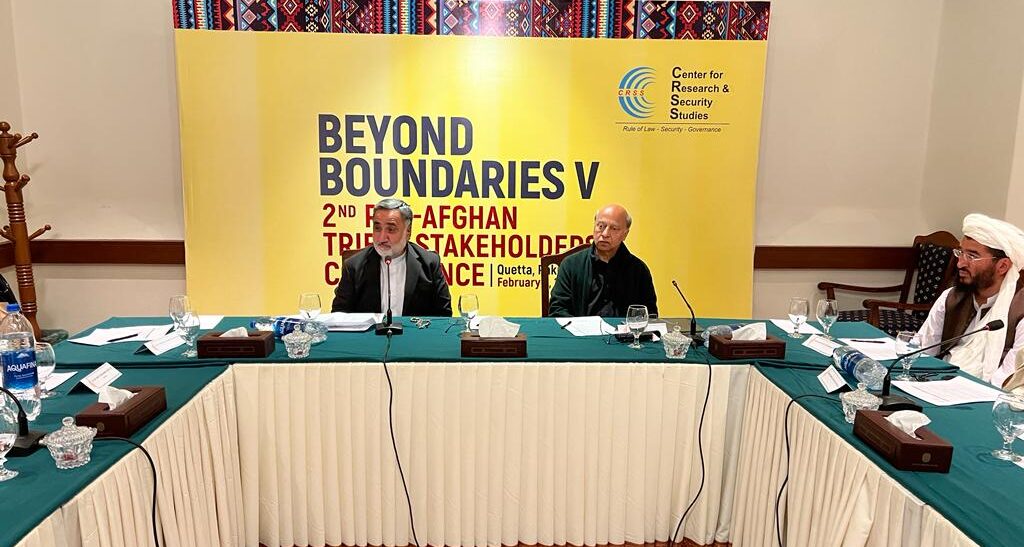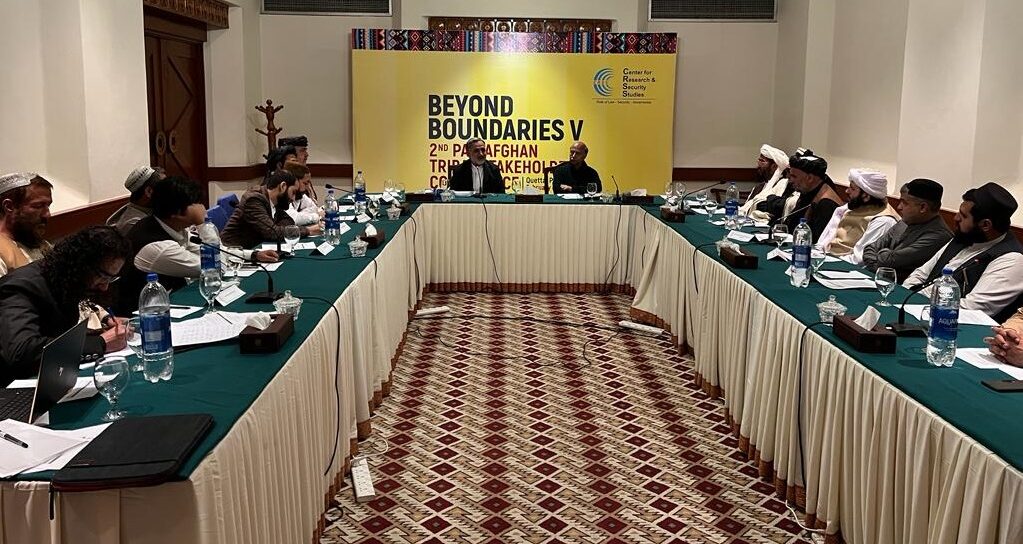Context
The Pak-Afghan relationship remains tense and sessile given the recurring volatility and chaos at the borders, especially the Chaman crossing points have seen unprecedented turmoil in the past few months. In the same vein, the attendees at the 2nd Pak-Afghan Tribal Stakeholders Conference elicited the need for sustained bilateral cooperation for socioeconomic development and lasting peace across the border regions. The forum – led by the Center for Research and Security Studies (CRSS) and the Organization for Economic Studies and Peace (OESP) – comprised tribal leaders, chieftains, and community influencers from the Chaman- Spin Boldak borders region.
Agenda
The conference’s agenda was centered on how tribal stakeholders may help address bilateral issues with peace and security, cross-border clashes at Chaman, economic connectivity, trade and transit, and most eminently women’s and girls’ rights in Afghanistan – noting the indefinite school ban by the Taliban for older girls in grade 6 and above.
Critical Analysis
Cross-border clashes emerged as dominant concerns as the repercussions become more personal – inflicting pain and adding misery to the lives of people living near the surrounding areas of the border. These clashes have led to rancor and ill-perception among the populace. Such transnational and civil conflicts are also creating a vacuum for the insurgencies such as Tehreek-e-Taliban Pakistan (TTP) as it builds and capitalizes on the sentiments of isolation and obtuseness of the youth in the region. Chaman border natives are pro-peace and have generally been non-supportive of any terrorist groups, but they fear that border clashes – if overlooked further – can provide a conducive environment to TTP and others.
Popular demand is that governments should empower the tribal figures to strengthen their role and efficacy in bridging the gap of misunderstandings on both sides and paving way for sustainable peace and security in the region.The natives also complain of ill-treatment while border-crossing,

especially when it comes to women, and highlighted the need for women police at border crossing points to check female travelers’ documents as they have traditional values and deem it inappropriate that male officials check their documents and do the scrutiny. Besides, the Taliban’s increased taxation policy is hampering the economic connectivity between the two countries and has also caused inflation as border closures impede the supply of goods – raising demand, hence the price hike. Girls’ education issue is more complex on the ground level. Whereas the Pakistani tribal leaders seem open to the idea of normalizing girls’ education across the region, the Afghans have different concerns. They opine that the standard of education is not at par even for the boys, so the normalization of education is out of the question for their daughters.
Sense of Meeting
Cross-border firing events and extended closures have not only disturbed the peace on both sides but have also hampered trade and transit and public mobility, and as a result, they continue to be the main cause of enmity between the two sides. Nothing that, the tribal leaders in the region are significant and relevant actors in the engagement with the Afghan Taliban concerning the matters of security, economic connectivity and trade, and women’s education. They possess certain clout and are familiar with the socio-psycho landscape of the Afghan Taliban as well as people living in the nearby areas of the Chaman and Spin Boldak borders. Moreover, they have influence and respect among the Taliban regime and the people in Chaman, Qandahar, and nearby areas. If these tribal leaders are engaged effectively, they will prove an antecedent in improved bilateral relations and regional stability. These stakeholders – if engaged via sustained iterations – can play an integral role in ensuring regional peace and stability, robust trade and economic connectivity, and amplifying voices in favor of girls’ education for a prosperous Afghan society and overall tribal regions.

Recommendations
Based on the thorough discussion and insights on the aforementioned issues, the participants from both sides tabled the following recommendations:
- Peace and Security, and Cross-border Cooperation
- Separate queues should be installed for men and men at the border crossing points since women from Afghanistan experience stampedes and uncivil treatment during border closures.
- The tribal stakeholders – elders, chieftains, and community influencers should be included in decision-making and dialogue on border issues by the governments of both countries. A committee should be formed in this regard under the supervision of CRSS. 29
- Messages of cross-border cooperation and peace efforts should be disseminated by the muftis and religious scholars on both sides via social media. CRSS should lead this strat comm initiative.
- Both countries should deploy women police officers at border areas to ease the process of immigration.
- Afghan government should devise a comprehensive counter-terrorism policy with the collaboration of relevant track 1.5/II actors on both sides to tackle ISKP, TTP, and other potential threats to regional security.
- Trade and Economic Connectivity
- Customs duties should be constant and the same for both sides.
- Chaman border opens for less than 12 hours a day. The border authorities should keep it open 24/7 as the Torkham border is accessible all the time.
- The Afghan government should decrease taxes to improve trade.
- Bilateral trade between both countries should be done in local currency, rather than the US dollar.
- Border markets/bazaars should be installed from both sides at the middle spots/zones.
- Border crossings should be facilitated by instating more qualified personnel and state-ofart-equipment. Custom departments can play an integral role in this regard.
- Refugees and Border Inhabitant Rights:
- People coming from Afghanistan faced hurdles due to the policies of UNHCR and NLC. A uniform policy should be devised in this regard.
- Refugee card issuance process should be made smoother and expedient so the current and incoming displaced Afghans can lead respectable lives during their stay in Pakistan.
- Refugee rights require stronger and more potent advocacy. Platforms such as CRSS should collaborate with international donors to work on socioeconomic and academic facilities for the Afghan refugees in Pakistan, as the host country’s current capacity cannot serve much to provide a sound living for the displaced population.
- Girl’s education, and social and economic welfare:
- Girls should be given allowed to attend schools and have higher education facilities similar to their male counterparts as per the Sharia and Quranic principles.
- Capacity-building workshops should be held for female doctors, midwives, and lady health workers in the border and rural regions of Afghanistan. Pakistani female doctors can lead these pieces of training.
- Educational facilities and socioeconomic development initiatives should be introduced in the border regions as per the cultural and tribal needs and sensitivities.
